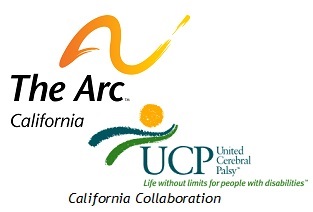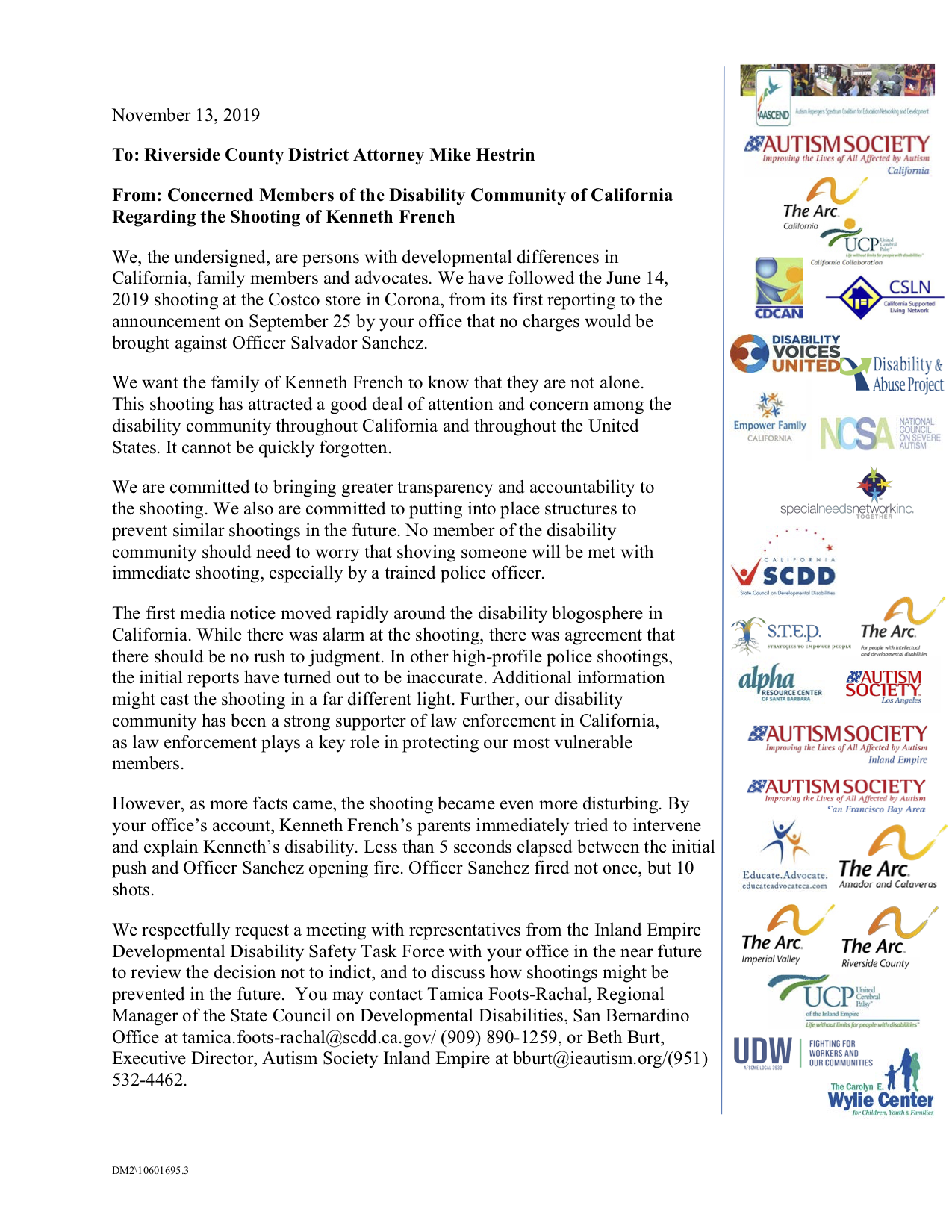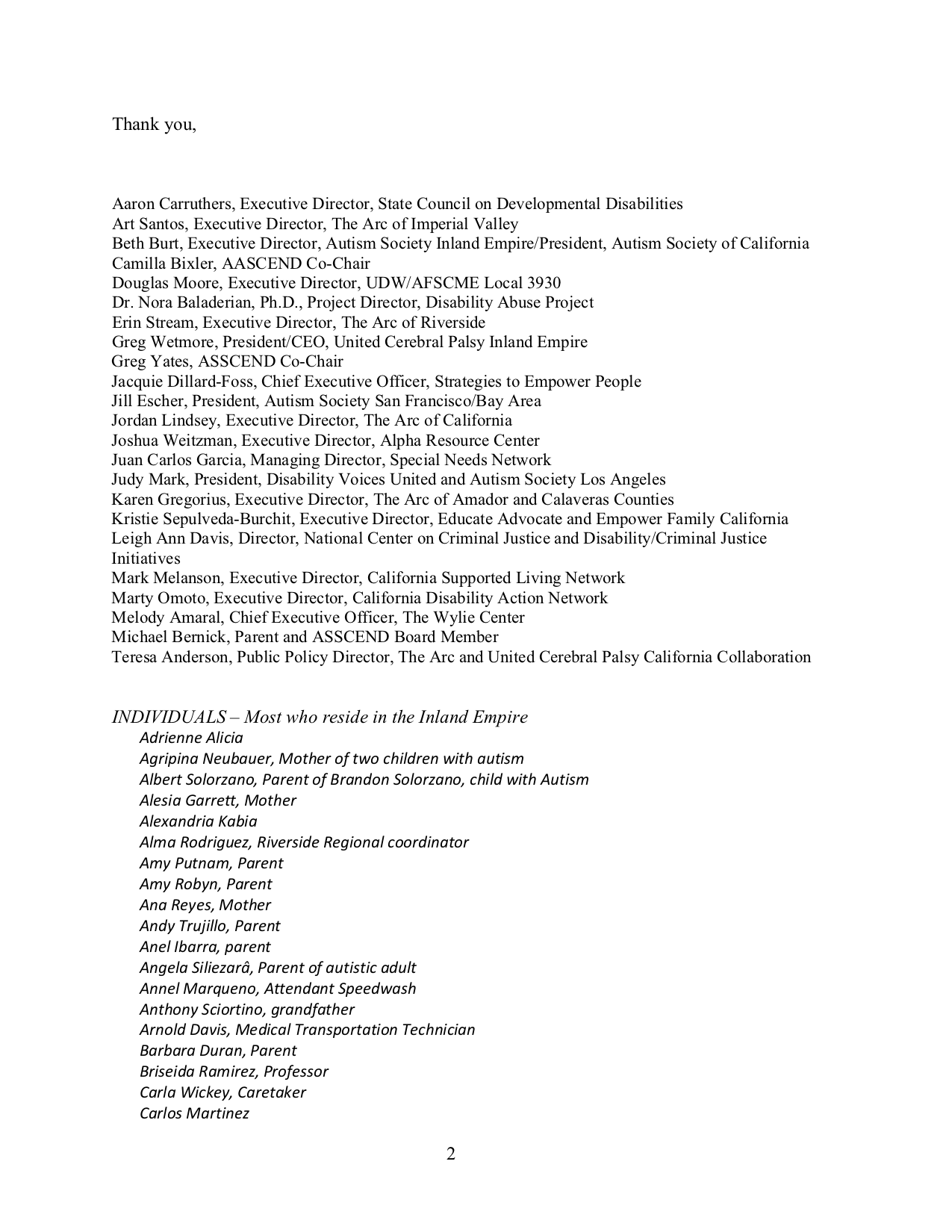April 9, 2021
Assembly Speaker Anthony Rendon
4909 Lakewood Blvd #400
Lakewood, CA 90712
Senator Lena Gonzalez
500 Citadel Drive
Commerce, CA 90040
RE: Los Angeles County Sheriff Department and Shooting of Isaias Cervantes
Dear Assembly Member Rendon and Senator Gonzalez,
The Arc and United Cerebral Palsy California Collaboration is among the largest and oldest advocacy organizations providing services, supports and advocacy with and for people with intellectual and developmental disabilities (IDD) and their families. The Arc/UCP CA Collaboration has a combined 36 chapters and affiliates throughout the state that provide direct services and supports to thousands of individuals and families. We are writing to request your help in addressing police use of excessive force against individuals with intellectual and developmental disabilities.
On March 31, 2021 Isaias Cervantes, a young man with autism who is also hard of hearing, was shot and critically wounded by a LA County Sheriff Deputy in your districts. Isaias and his family are your constituents and they, along with every other constituent with disabilities, deserves to be treated with dignity and respect regardless of whether or not they are experiencing a personal or familial behavioral crisis. Detailed accounts of the shooting are sparse at this point as there is an active and on-going investigation; however, the underlying facts still remain that despite the deputies being told by Isaias sister that he is hard of hearing, has autism, and was in the midst of a behavioral crisis, the deputies responded with excessive and a near lethal use of force. The LA County Sheriff’s Department stated that this was a “very unique situation” and while that may be true there is absolutely no justification whereby shooting an unarmed man can be seen as a necessary or justifiable use of force.
In 2019 Assembly Bill 392 Peace Officers: Deadly Use of Force, and Senate Bill 230 Law Enforcement: Use of Force: Training and Polices, were signed into law as part of a Use of Force Reform sparked by the social unrest and protests that resulted from the shooting of Stephon Clark. Together those bills reformed police use of force policies and now the law requires that, among other things, use of deadly force be necessary, not merely reasonable, and that nonlethal alternatives be used first. How could it be necessary to shoot an unarmed man in the back? Moreover, the near fatal interaction was said to have taken place in a very short period of time – less than 5 minutes – what other nonlethal alternatives were attempted?
Welfare and Institutions Code, Section 5150 allows a peace officer, among other specified individuals, to take a person, upon probable cause, into custody and place them in a designated facility for mental health evaluation and treatment, as a result of a mental health disorder whereby the person is deemed to be a danger to themselves or others. It is not uncommon for families or care providers to ask for this type of assistance when their loved one is experiencing a behavioral crisis as to ensure everyone’s safety. For the Cervantes family, what started out as a request for help to keep everyone safe ended in a near fatal interaction between a young man with disabilities and law enforcement. LA County Sheriff’s Department is no stranger to the 5150 process, given that they have a very active Mental Health Evaluation Team. Last year alone, they responded to 17,215 calls involving persons with a mental illness in crisis, of those calls, 10,470 were confirmed to be individuals with a mental illness or a developmental disability.
Fear of a law enforcement encounter going bad runs deep in the disability community as it is estimated that 30% -50% of all fatal law enforcement encounters involve a person with a disability. At the highest risk are African American males who have autism and are deaf. In fact, the legislative findings in AB 392 expressly state that individuals with physical, mental, intellectual, or developmental disabilities are significantly more likely to experience greater levels of physical force during police interactions, as their disability may affect their ability to understand or comply with peace officer commands. (Penal Code 835(a)(5)). Senate Bill 230 expressly states that the highest priority of California law enforcement is safeguarding the life, dignity, and liberty of all persons without prejudice to anyone. It further provides under Government Code 7286(b)(16) that each law enforcement agency shall, by no later than January 2, 2021, maintain a policy that provides a minimum standard on the use of force. Each agency’s policy shall include… (16) Training and guidelines regarding vulnerable populations, including, but not limited to, children, elderly persons, people who are pregnant, and people with physical, mental, and developmental disabilities.
The safety and lives of our loved ones with disabilities – intellectual, developmental, or other – cannot be reduced to mere words in a legislation. We cannot rely on “guidelines and training” because clearly, in all too many incidents, that has proven ineffective. All the training in the world does not matter if push literally comes to shove, and the batons, tasers, and guns are the default response to a person in the midst of a behavioral crisis. In the wake of the shooting and killing of George Floyd, the California Legislature has taken on a deep and meaningful discussion about what police reform looks like – there is a new Select Committee on Police Reform, the Little Hoover Commission held hearings on Police Training, and there are several pieces of legislation pending – but disability, which is significantly different that mental health issues, is nearly non-existent in the conversation. It is well passed time to fully include the disability community in the conversation about how to strengthen the relationship between law enforcement and the disability community when it comes to challenging interactions. Our community is truly between a rock and a hard place because we rely on the police for help when our loved ones are lost, scared, hurt, or in crisis but underlying that need is the fear that anyone of those interactions could go bad and result in loss of life or trauma.
On behalf of all individuals with disabilities, their families, friends and service providers, we respectfully as that you both work with us to address the very specific issue of use of force in the disability community. Thank you for taking the time to read our letter and we look forward to further discussions with you.
Respectfully,
Pat Hornbecker, President
The Arc of California
Jordan Lindsey, Executive Director
The Arc and United Cerebral Palsy California Collaboration
Cc:Assembly Member Mike Gipson, Chair of Assembly Select Committee on Police Reform
Assembly Member Reginald Jones-Sawyer, Chair of Assembly Public Safety Committee
Senator Steven Bradford, Chair of Senate Public Safety Committee
1. LA County MET https://lasd.org/wp-content/uploads/2021/01/Transparency_MET_Annual_Recap_2020_012521.pdf
2. The Ruderman Family Foundation, White Paper on Media Coverage of Law Enforcement Use of Force and Disability. https://rudermanfoundation.org/wp-content/uploads/2017/08/MediaStudy-PoliceDisability_final-final.pdf








